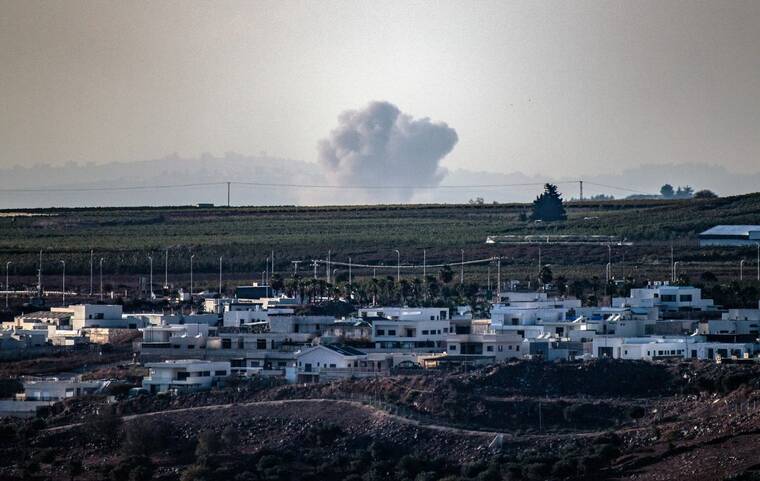U.S. sends additional forces to Middle East as tensions soar

REUTERS / GIL ELIYAHU
Smoke billows over southern Lebanon following Israeli strikes, amid ongoing cross-border hostilities between Hezbollah and Israeli forces, as seen from the Israeli side of the Israel-Lebanon border, today.
WASHINGTON >> The United States is sending a small number of additional troops to the Middle East given escalating tensions between Israel and Lebanon’s Hezbollah, the Pentagon said today, declining to specify the precise number or mission of the deployed forces.
“Out of an abundance of caution, we are sending a small number of additional U.S. military personnel forward to augment our forces that are already in the region,” Air Force Major General Patrick Ryder, a Pentagon spokesperson, told reporters.
After almost a year of war against Hamas in Gaza, Israel is shifting its focus to its northern frontier, where Hezbollah has been firing rockets into Israel in support of its ally Hamas.
Israel’s military today struck Hezbollah in Lebanon’s south, eastern Bekaa valley and the northern region near Syria in its most widespread strikes. An Israeli strike today on the southern suburbs of Lebanon’s capital targeted senior Hezbollah leader Ali Karaki, the head of the southern front, a security source told Reuters.
President Joe Biden’s administration has been seeking to contain the conflict to Gaza and has repeatedly called for the Israel-Lebanon border crisis to be resolved through diplomacy. That call for diplomacy has been underscored by U.S. Defense Secretary Lloyd Austin, in daily calls with Israeli Defense Minister Yoav Gallant.
Experts question whether Iran would stay on the sidelines if Lebanon’s Hezbollah’s existence were threatened and say U.S. troops could also find themselves targeted throughout the Middle East if a regional war breaks out.
Don't miss out on what's happening!
Stay in touch with breaking news, as it happens, conveniently in your email inbox. It's FREE!
In their call on Sunday, Austin suggested that no outside actors should intervene in the conflict.
“The Secretary made clear that the United States remains postured to protect U.S. forces and personnel and determined to deter any regional actors from exploiting the situation or expanding the conflict,” the Pentagon said in a statement.
Those U.S. capabilities include the Abraham Lincoln aircraft carrier strike group, fighter aircraft and air defenses.
“We have more capability in the region today than we did on April 14th when Iran conducted its drone and missile attack against Israel,” Ryder said.
“So all of those forces combined provide us with the options to be able to protect our forces should they be attacked.”
Ryder referred to Iran’s attack by more than 300 missiles and drones, which caused only modest damage inside Israel thanks to air defense interceptions from the United States, Britain and other allies in the region. The April 14 strikes were Iran’s first-ever direct attack on Israel.



